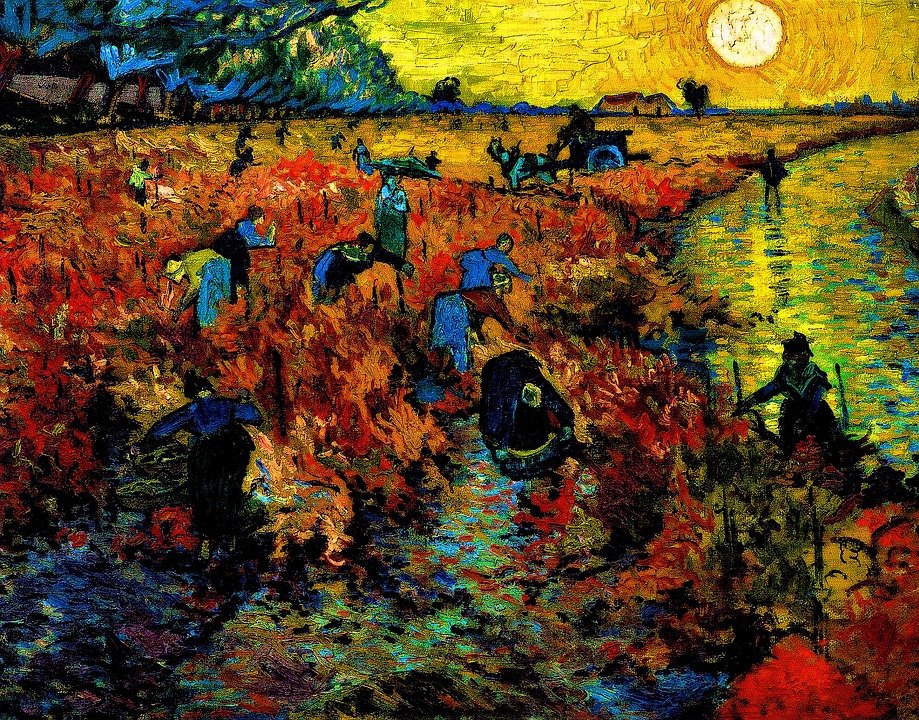A Spirituality of Pruning

In This Issue
Notes: The Spirituality of Pruning · In Other Words: Martha, Martha; Bishop Barron: Breaking Through the Buffered Self · News: Writing News; No Shortage of People in Need; Bike Saga, Part 2 · Postscript: A Midsummer Garden
Get “Notes in Glass Bottles” in your inbox every Sunday.
NOTE
A Spirituality of Pruning
In the garden and in life, I’m learning to choose where to put my energy.
I’m back from our family vacation and more or less caught up on all the work that backed up while we were gone—even the weeding. The weed situation hadn’t been great when we’d departed in June, but by the time we got back, any semblance of cultivation had been buried under an avalanche of green.
(You have to admire weeds: they’re the overachievers of the plant world. Prolific, fast, aggressive, durable. If only our food-bearing plants were endowed with such qualities! I suspect the reason they’re not is because it takes a lot of energy to, say, grow a tomato. On the other hand, we could eat certain weeds if we weren’t so picky, dandelions being the prime example. I recently learned that my old nemesis, creeping Charlie, is not only an edible green, but was actually imported by Europeans as a medicinal herb. It’s a member of the mint family. If the food system and our garden ever fails, we can thank our weedy lawn for providing us with about a month’s worth of greens fortified with vitamin C and iron.)
After I had hacked my way through the jungle of morning glory vines and creeping Charlie and wild artichoke that had grown up over my tomatoes and lettuce and butternut squash, I turned my attention to the grapes, which in our absence had thrown long, leafy vines everywhere with all the careless abandon of a teenager tossing wet towels around the bathroom after her shower.
I vaguely remembered something in the Bible about grape vines needing to be pruned, so I turned to that other gospel, Google, for the details.
Sure enough, everyone said you definitely had to prune grapes. “You want to prune the vines back several times a season so the plants will put all their energy into the fruit,” one grower said. “If you don’t, you’ll get more grape clusters, but they’ll be smaller.”
I’ve long ignored advice about pruning. It feels counterintuitive to cut back all that hard-won growth on your fruit tree or tomato. It just seems like less green growth would result in less fruit. This logic may also be the reason why, for years, I overcrowded my tomatoes and other plants: more plants ought to equal more fruit, right?
But this time, the viticulturist’s advice got through to me: The plant has only so much energy and resources. It can put that energy into vines and leaves, or it can put that energy into fruit.
If you want more fruit, you have to cut back the vines. It’s that simple.
If I needed further proof of the wisdom of this approach, our apple tree is providing it in the form of the most abundant crop we’ve seen in years. Not so coincidentally, I had pruned our mature tree pretty aggressively in the early spring.
(Why the local squirrels haven’t stripped the tree bare is another mystery entirely. Usually by this point in the season, our tree consists of a handful of lonely apples, and by mid-August, even those are gone. It makes me wonder what kind of evil game they think they’re playing.)
Inspired, I gave the grape vines their much-needed haircut, and now they look more civilized (although nothing like they should, if I’d properly pruned and trained them from the beginning.)
Sometimes I think I don’t grow a garden so much as the garden grows me. The practice of growing things to feed yourself and others not only imparts horticultural knowledge, but spiritual lessons as well.
In this case, pruning the grape vines made me think about the wisdom of pruning my own life. I tend to have the same attitude toward life as I have toward gardening: I want to grow all the things! And this is why I find my time and energy divided a dozen different ways. I’m on the social concerns committee at our parish. I’m in a book club. I’m neck-deep in resettling Afghan refugees. I’m doing writing, marketing, and web development projects for a handful of clients, several of which I’m doing pro bono. I spend thirty minutes or more a day talking to a lonely friend who has been shut up in a nursing home for the past year. I’m trying to write a handful of books, manage a business, maintain the house, clean the house, and spend quality time parenting my kids. And last but certainly not least, I’m told I should be spending time every day managing my household finances, exercising, and praying. In short, my life often mirrors my garden: a wild, happy mess, but one that could probably do with some prudent pruning. It’s a hard but true fact: I only have so much time and energy. If I want to bear good fruit, I need to figure out where to focus it—and that necessarily requires some pruning, like it or not.

IN OTHER WORDS
Martha, Martha
“Martha, Martha, you are anxious and worried about many things. Only one thing is necessary” (Luke 10:41).
I’ve run across that reading four times in the past month or two, which I guess I’ll interpret as further support for the wisdom of pruning.
Bishop Barron on the Buffered Self
The big news in the local Catholic community—and in our home in particular—has been the appointment of Bishop Robert Barron as the new Bishop of the Diocese of Winona-Rochester. For those not in the know, Bishop Barron (or “BB,” as one of our kids is now calling him) is what passes for a celebrity in Catholicland, thanks largely to his high-profile evangelization ministry, Word on Fire.
His appointment is especially significant for the Windley-Daoust household because my wife is the Director of Missionary Discipleship (i.e., evangelization) at the Diocese of Winona-Rochester, and Bishop Barron will be her new boss.
I’ve always liked Bishop Barron; he’s eloquent, smart, and a theology/philosophy supernerd: he knows all the things, gracefully leaping from Plato’s Phaedo to Joyce’s Portrait of the Artist as a Young Man, and from there to Paul Tillich’s Theology of Culture. He casually tosses around Greek, Latin, and Hebrew etymology, then switches things up with a reference to Bob Dylan or Johnny Cash. You might say he’s the Simone Biles of Catholic theology.
The other day I was looking for an interview he did for The Word on Fire Show about his new appointment and I stumbled across the lecture he presented for the 2022 Albert Cardinal Meyer Lecture, “Breaking Through the Buffered Self.” The Lecture is pitched to a more educated audience, so he was really in his element.
The “buffered self” is philosopher Charles Taylor’s name for the modern phenomenon of individuals isolated from any transcendent reality. In his lecture, Barron proposes that the way to break through this “buffered self” is via the three classic “transcendentals”: the true, the good, and the beautiful.
I won’t attempt to summarize the entire presentation—it’s more than two hours long (broken up into two lectures)—but let’s just say, this is Bishop Barron at his best. It’s engaging enough that I was reluctant to stop listening even well past my bedtime.
That’s not to say that I’m entirely on board with his entire program. His Thomistic account of beauty as something ontologically “out there” that influences the observer by means of attraction seems a little too neat to cover all human experiences of the beautiful, for instance; I personally think the experience of beauty has a much more relational dynamic.
And his conclusion seemed to imply that successful evangelization and catechesis (“breaking through” the modern “buffered self”) is a relatively straightforward matter of leading young people to see that anything that they find true, good, or beautiful possesses those qualities only because they participate in the ultimate truth, goodness, and beauty of God. That may have worked for him when he taught seminarians at Mundelein Seminary. Equipping your average volunteer catechist or high school religion teacher to do that with a class of fifth- or ninth-grade students is an entirely different matter, I think. Ultimately, most people will not be persuaded to believe in God by rational arguments, no matter how eloquent, but by a personal encounter with the divine. Mediating that encounter has been the fundamental work of evangelization since the beginning, and it needs to be our starting point even today. You can listen to the lecture here.
NEWS
Writing News
Besides catching up on the weeding, I’ve continued to work on projects for clients.
At the top of my “personal projects” right now is the CatholicWorker.org launch. I’m very close to completing my first pass of the 190 CW communities included in the community directory. This has been fun and interesting work (aside from all the copying and pasting of contact details)…it’s given me a very good overview of the incredible diversity spawned by the Catholic Worker movement. Plus, I think I’ve found a solid dozen communities I’d love to join, if my situation were different. Anyway, I hope that I’m eventually able to visit some of them, maybe in a journalistic role.
I’m hoping the new website will launch by mid-September.
No Shortage of People in Need
We’re coming up to the one-year anniversary of the fall of the Afghan government and the evacuation of Kabul. The Afghan crisis has largely fallen out of the U.S. news cycle, but the reverberations of those events continue all across the country.
Here in Winona, one of the two families that moved to Bloomington in May is returning in a week—with a new baby in tow. As we expected, they didn’t receive the support they needed up there. Now they’re moving back (and we’re glad to have them); and they’re bringing another Afghan family with them—relatives from Pennsylvania who evacuated at the same time but landed in a different part of the country. All told, we’ll have four more adults and eight children in our sponsor group on top of the four adults we’re already sponsoring.
Yes, it’s going to be a little crazy.
Keep the evacuees in your prayers. Many of them are under immense stress: besides the shock of their cultural dislocation, some are also dealing with PTSD from the horrors they witnessed during the war or the evacuation. On top of that, most of these people left close family behind in Afghanistan, and the news hasn’t been great lately—an earthquake, drought, floods, and an economic collapse and famine. The wife of one of the men we work with had a stray bullet graze her forehead. How do any of them get up and function from one day to the next?
Speaking of people in a tough spot (as if there were ever any shortage!), we’ve also been sending money, as we can, to our friend, Ludmila Kaplina. Ludmila was the main facilitator for Alex’s adoption, and she continues to work with orphanages across Ukraine. Most of the children in these orphanages are physically or mentally handicapped and unable to evacuate the country. If you’re interested in supporting her and her work, you can send money to her via Paypal at: mila.work28@gmail.com. You can reference me; I asked whether I could share her information, so she won’t be surprised. If you do decide to support her work, you’ll get a heartfelt note of thanks in return. My takeaway: the money is appreciated and needed, but knowing that ordinary Americans haven’t forgotten their plight is perhaps even more important, in terms of morale.
Yep, I Got a New Bicycle
Following the theft of my bicycle, I shortened and adapted the piece I wrote for this newsletter and sent it into the local paper.

I don’t think I’ve ever had more direct feedback on anything I’ve ever written. Even today, more than a month after the piece ran, I had two different women at church ask me whether I’d found my bike.
Well, the answer is no, and I suspect it’s gone for good. So, a few weeks ago I went down to Adventure Cycle and Ski here in Winona and picked up a cherry red 2022 edition Trek FX 2. It’s a nice update from my 1986 Schwinn road bike—much lighter, with better shifting and braking. I didn’t waste a moment registering it with the Winona Police Department. And yes, I lock it up—even in the garage.
It’s good to be able to get around on my own again. But I also continue to feel grateful that, most days, I’m not too bitter, angry, or resentful about the theft. It is good to be free, and I thank God for that freedom.
POSTSCRIPT
A Midsummer Garden


It’s midsummer, which means all the work I put into the garden last fall and this spring is beginning to pay off…mostly, as you can see, in flowers; although this year for the first time, we also seem to be growing a very good crop of Golden Crisp apples. We’ll see whether the squirrels will let us enjoy any of them. (I suspect they’re lying in wait, ready to steal every last fruit just before they’re ready to pick.)
Our vegetables have not done as well, sadly. The tomatoes in particular have had a rough year, many of the plants struck down by fusarium wilt, as has happened often in the past few years. I hate to give up growing them, given the cost of fresh tomatoes, but we may have no other choice. The pole beans are MIA, too. They may have gotten lost in the Morning Glory vines.
The butternut squash, too, have only just begun to set fruit, and not as abundantly as in past years. Many of the plants were overrun by a profusion of Morning Glory vines while we were gone on vacation, and although I cut back the Morning Glories, I’m not sure they will recover.
The basil is doing good, though, and so are the grapes. And the flowers: this has been the breakout year for our Brown-Eye Susans and Purple Coneflower. And last year’s Morning Glories self-seeded, wreaking havoc in the garden (thanks to my refusal to pull them!) but leaving us with a beautiful display of purple and rose flowers every morning.
Isn’t it strange that we grow flowers? We can’t eat them (usually); they’re only just beautiful. Bur maybe the fact of their gratuitous beauty is reason enough to keep them around.

Stay cool, stay well…

Cover photo credit: Vincent Van Gogh, The Red Vineyard near Arles (1888)
All other photos by Jerry Windley-Daoust.





